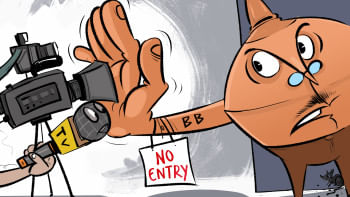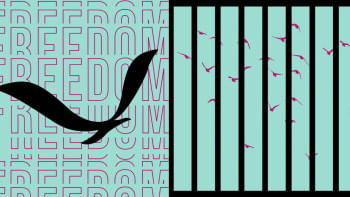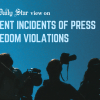Column by Mahfuz Anam: Has Bangladesh gained anything by a restrictive press?

Free press was once used to hold power to account. Nowadays, it is power that holds the press "accountable"—not, of course, in terms of exposing the truth, but more in terms of colouring it to justify the pervasive inequality and plundering of the poor.
As we observe World Press Freedom Day in Bangladesh today, we recall that there are nine laws in operation that directly or indirectly hamper the functioning of free press, and there are four others in advanced stages of preparation. It is interesting to point out that laws exist to prevent serious and society-disrupting crimes like murder, physical assault, rape, kidnapping, child abuse, child marriage, etc, but nothing compared to the number of laws that are in operation to curtail the free press.
The Digital Security Act (DSA) and the Road Transport Act (RTA) were passed together in September 2018. The former was enacted—officially meant for cybercriminals—immediately, following which hundreds of journalists, artists, cartoonists, teachers, writers, etc were jailed, but the latter law remains to see its full and effective implementation. This in spite of thousands of deaths on our roads. The Money Laundering Prevention Act, 2012 was supposed to have been revised, but remains unattended. In the meantime, $8.27 billion is laundered out of the country every year, according to the US-based Global Financial Integrity (GFI). This, again, in spite of our severe dollar crisis.
So many laws enacted in such a speedy manner in the case of the media, and the neglect for the necessary laws in other vital areas when the country needs them urgently, speak volumes as to our priority. What constitutes a greater danger to society, from an official perspective, couldn't be clearer.
In addition, new administrative fiats are being announced that curtail journalists' scope to serve the society. Take the latest example of Bangladesh Bank (BB). It has informally started a practice that prevents journalists from entering BB premises to search for and collect reports that are of public interest. Journalists can only enter to meet the spokesperson, and that also with a prior appointment.
Why has this practice been introduced? How will it serve public interest? Has journalists' work harmed BB's operation in any way? Has our reporting done any damage to our economy? We would be happy to hear the governor's complaints about journalists' work, behaviour, etiquette or ethics. We would be willing to sit with the relevant authority of BB and discuss how these functional problems can be ameliorated without hampering professional journalism.
On the face of it, and without BB explaining why, we consider this latest restriction on journalists to be anti-democratic, anti-free press and anti-public interest. This restriction may end up hiding corruption, covering up scams, preventing public knowledge of illegal and dangerous bank takeovers, preventing severe irregularities from coming out, and generally endangering the banking sector by preventing accountability.
Then again, does the Bangladesh Bank have the right to prevent the media from covering this highly important public institution? Other than military institutions that deal with national security, no other institution can be kept above and beyond open public scrutiny.
Take the following few cases as examples: 1. Hallmark scam at Sonali Bank; 2. Basic Bank loan scam; 3. Bismillah Group loan scam covering five local banks, including Janata, Prime and Jamuna; 4. Anontex loan scam at Janata Bank; 5. Crescent Group loan scam at Janata Bank; 6. PK Halder syphoning off Tk 10,000 crore from four non-bank financial institutions; 7. Farmers Bank loan scam; 8. NRBC Bank loan scam; and 9. the reserve heist from BB itself.
All the above cases were investigated by the central bank, but none were made public. The reports might have gathered dust at the desk of high-level officials, whether as a result of some deals or just due to their usual practice—we would never know. These incredible scam stories became public knowledge only because some conscientious officials were compelled by their love for the country and commitment to the national interest to share such reports with the media. If restrictions like the ones presently imposed existed at that time, NONE of these scams would have reached the public. Whose interest is the BB aiming to serve by imposing these restrictions?
There are all sorts of ownership violations and excessive borrowing by owners themselves from their own banks through false claims, as well as mutually agreed borrowing from each other's banks in violation of banking laws. Media, by regularly bringing them to light, helps the government in vital ways.
Such a level of corruption could not have flourished if the media had the scope to reveal these activities through timely reporting. If the government allowed for a rise of quality journalism through enacting nurturing laws instead of preventive ones, the whole corruption scenario would have been dramatically different. The same would have been the case with abuse of power, nepotism, cronyism, tax evasion, and every other ill.
Both national and international experts have expressed grave doubts about the strength of our banking system. Ask every honest, fully tax-paying business person, and they will express their grave concern about the state of our banking system. Just one single issue of non-performing loans (NPL) illustrates our point. Over many years, BB, instead of trying to restrain it, allowed this issue to reach its present mountain-high level. BB's role stood as a mockery of those who repaid bank loans diligently.
In the absence of the parliament's "watchdog" role overseeing the executive branch's work, especially dealing with the economy and the banking sector, it has been only the media that has highlighted the negative impact of NPLs and decried BB's policies of surrendering to the greed-ridden and pernicious role of a section of businessmen.
Has Bangladesh gained by restricting the press over the years? Our answer is amply illustrated by the above example. To further answer that question, judged by the rise of corruption, total lack of accountability of the political class, absence of transparency in bureaucracy, the rise of unbridled power of police and other law enforcement agencies, and the overwhelming sense of disempowerment of the public in general, Bangladesh has suffered greatly by restricting the media.
Such a level of corruption could not have flourished if the media had the scope to reveal these activities through timely reporting. If the government allowed for a rise of quality journalism through enacting nurturing laws instead of preventive ones, the whole corruption scenario would have been dramatically different. The same would have been the case with abuse of power, nepotism, cronyism, tax evasion, and every other ill. Examples galore where laws that protect the media have been seen to contribute in most effective ways towards its development. Freedom, as Amartya Sen highlighted, is a vital element for development.
Instead, an antagonistic atmosphere was created in which the government and independent press were seen to belong to the opposite sides. It is our strong belief that a free and independent media is sine qua non for Bangladesh's future progress. There is no better way of bringing about accountability than allowing independent media to flourish. No government agency or party network can provide authentic information about the real situation as free media can. Nobody wants to bring the bad news to those in power. It will always be tempered by fear and coloured by self-interest. There is no surer way of preparing ourselves for our next stage of development than building a credible accountability structure, and a free media is the best bet.
Mahfuz Anam is the editor and publisher of The Daily Star.
Follow The Daily Star Opinion on Facebook for the latest opinions, commentaries and analyses by experts and professionals. To contribute your article or letter to The Daily Star Opinion, see our guidelines for submission.

 For all latest news, follow The Daily Star's Google News channel.
For all latest news, follow The Daily Star's Google News channel. 












Comments